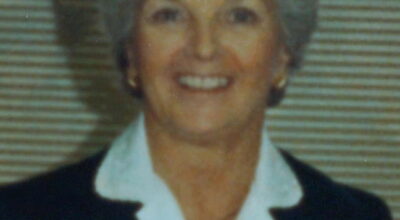Enoch: Enoch: George E. Tomlinson, lumberman
Published 3:00 pm Saturday, June 3, 2023
|
Getting your Trinity Audio player ready...
|
By Harry Enoch
Contributing Writer
George Edward Tomlinson (1873-1953) came to Kentucky from Michigan and made a name for himself in Winchester. He proved his business acumen in the lumber industry, starting a company that still continues today. Tomlinson also took a significant role in the civic life of the city.
Born in Bay City, Michigan, George Tomlinson grew up in the lumber business. His father was a lumber manufacturer, and his brother, W. H. Tomlinson, ran his own lumber company, W. H. Tomlinson & Company. When George came to Kentucky at 17, he already had four years of experience operating a bandsaw. He found ready employment on the bandsaws at the Asher Lumber Company at Ford. They changed their name to Burt and Brabb Lumber Company in 1896 after being acquired by two Michigan natives, Wellington R. Burt and Marvil I. Brabb, who helped turn Ford into a major industrial center.
In 1900 Tomlinson founded the Reliance Manufacturing Company in partnership with George Hon. Their mill at Bowen in Powell County produced specialty millwork. They moved the business to Winchester in 1901 and located on a siding of the C&O Railroad near the freight depot and extending all the way to Winn Avenue. After the factory and lumberyard burned in 1902—a $40,000 loss—Tomlinson rebuilt on a larger scale than before. Reliance produced raw lumber, fine interior finishings, shingles and barrels. They had a large business selling a line of specialty building materials to markets in Kentucky, Ohio, and Michigan. In 1909 Tomlinson was elected president of the Kentucky Retail Lumber Dealers Association.
In 1910 Tomlinson sold his Winn Avenue mill to McCormick Lumber Company and incorporated on his own as the Tomlinson Company. He erected a new Magnolia Street plant focused on producing tobacco hogsheads. To improve manufacturing productivity, he invented an automatic jointer, a machine for producing barrel staves for his hogsheads. He was soon making 100,000 hogsheads annually.
Tomlinson’s inventive mind led to several inventions. A search turned up six U.S. patents issued in his name. The most famous was the Tomlinson Takedown Table. These were popular for banquet halls, where they could be quickly assembled or taken down for storage. He expanded the Magnolia Street plant to produce takedown tables. In 1925 he secured a large table order from the new Palmer House Hotel in Chicago.
Tomlinson was a director in the Clark County National Bank before serving as president of Winchester Bank for 20 years. He served for many years as president of the Winchester Commercial Club. During the 1907 Jamestown Exposition, in his capacity with the Commercial Club, Tomlinson inaugurated a “Winchester Day” and gave an exhibit of Blue Grass history, soil, climate, productions and advantages in educational, religious, social, aesthetical and other lines. He served seven years on the Conference Board of Education of Kentucky, was a member of the Board of Directors of Wesleyan College, and was prominent in the work of the Methodist Episcopal Church, where he was chairman of the Board of Stewards, superintendent of the Sunday school, and chairman of the building committee in charge of erecting their $100,000 church on South Main Street. He reportedly owned the third automobile in Clark County.
Tomlinson was elected Winchester’s ninth mayor in 1922. During his term, Winchester adopted the commission form of government.
In 1896 Tomlinson married Maude Derickson of Powell County, a daughter of Thomas Derickson, a leading attorney of Stanton. Maude entertained regularly; her parties were often featured in the Winchester Sun society column. She and her husband had two children: a son Orlin who was associated with his father in business, and a daughter Laura. George and Maude are buried in Winchester Cemetery.
Following Tomlinson’s death, his grandson, Gene Freeman, took over the company and expanded the business. The company is still operating as the Freeman Corporation, which specializes in wood veneer production.






